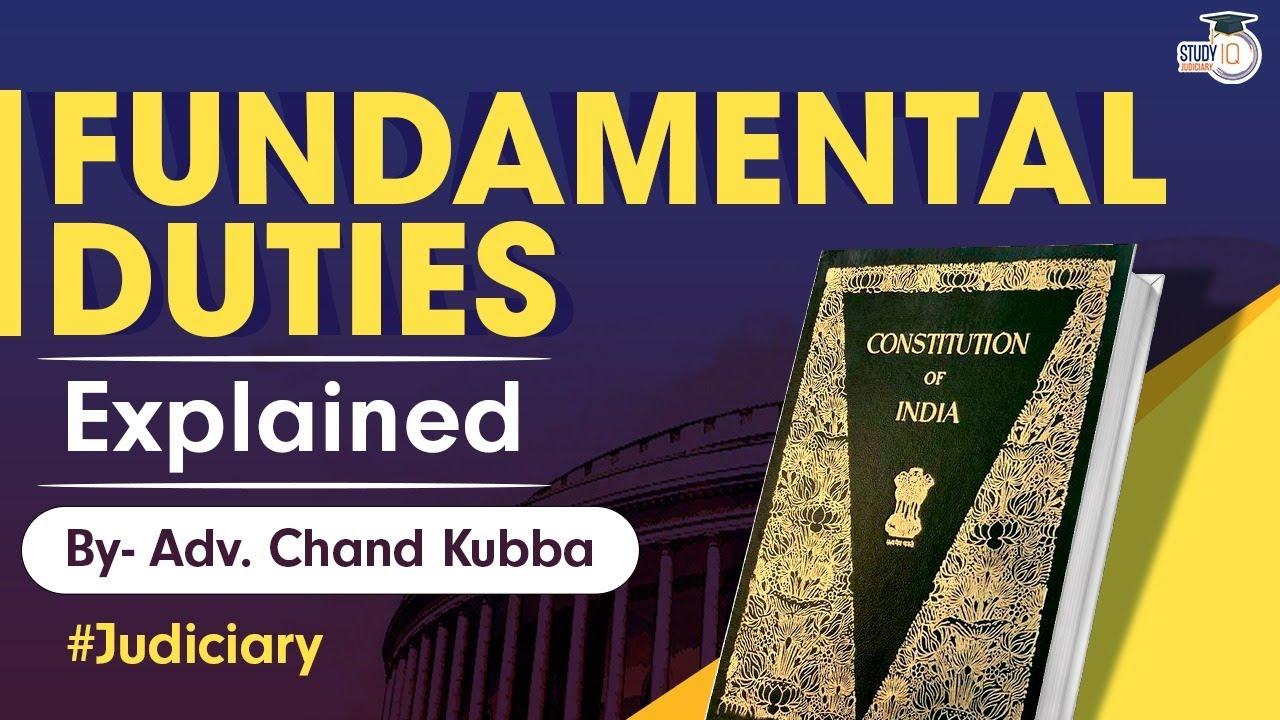Table of Contents
Fundamental Duties: Article 51-A
Origin of the Concept

- Dharma- Duty
- The concept of duties has its origin in the Vedas.
- Dharamshastras also mention duties of each group in society.
- Epics like Bhagavad Geeta, Ramayana and Mahabharat, also enshrine duty as part of one’s Dharma.
Need for Fundamental Duties-
- Democracy- Peoples Participation- Primary feature.
- Fundamental Rights are there with people.
- Article 51(A) provides 11 Fundamental Duties
- Initially there were 10 FDs added, Were added to the constitution by the 42nd Amendment in 1976
- Added upon the recommendations of the Swaran Singh Committee
- 11th FD was added to Art. 51(A) by the 86th Amendment in 2002
- Some Recommendations of Swaran Singh Committee Report were rejected by the then Government – one was – non-compliance of the fundamental duties would be met with imposition of penalty or punishment on citizens.
51A. Fundamental duties.—It shall be the duty of every citizen of India—
- (a) to abide by the Constitution and respect its ideals and institutions, the National Flag and the National Anthem;
- (b) to cherish and follow the noble ideals which inspired our national struggle for freedom;
- (c) to uphold and protect the sovereignty, unity and integrity of India;
- (d) to defend the country and render national service when called upon to do so;
- (e) to promote harmony and the spirit of common brotherhood amongst all the people of India transcending religious, linguistic and regional or sectional diversities; to renounce practices derogatory to the dignity of women;
- (f) to value and preserve the rich heritage of our composite culture;
- (g) to protect and improve the natural environment including forests, lakes, rivers and wild life, and to have compassion for living creatures;
- (h) to develop the scientific temper, humanism and the spirit of inquiry and reform;
- (i) to safeguard public property and to abjure violence;
- (j) to strive towards excellence in all spheres of individual and collective activity so that the nation constantly rises to higher levels of endeavour and achievement;
- (k) who is a parent or guardian to provide opportunities for education to his child or, as the case may be, ward between the age of six and fourteen years.
Enforcement of Duties
- Fundamental Duties are not enforceable in court of law.
- SC in Minerva Mills Ltd. v. Union of India held
- The law may provide a mechanism for enforcement of this obligation, but the existence of the obligation does not depend upon the creation of such mechanism. The obligation exists prior to and independent of the mechanism of enforcement. A rule imposing an obligation or duty would not therefore cease to be a rule of law because there is no regular judicial or quasi-judicial machinery to enforce its command. Such a rule would exist despite of any problem relating to its enforcement.
JUSTICE VERMA COMMITTEE REPORT OF 1999-
- Committee to Operationalise Suggestions to Teach Fundamental Duties to the Citizens of India –
- Recommended that –
- “duty to vote at elections, actively participate in the democratic governance and to pay taxes should be included in Article 51-A.”
- NATIONAL COMMISSION TO REVIEW THE WORKING OF CONSTITUTION-
- “the first and foremost step required by the Union and State Governments is to sensitise the people and create a general awareness of the provisions of fundamental duties amongst the citizens on the lines recommended by Justice Verma Committee.”
- 86TH AMENDMENT, 2002
- Article 51-A(k) – the duty of every parent or guardian to provide opportunities for education to his child between the age of 6 and 14 years which corresponds to right to free and compulsory education in Article 21-A of the Constitution.
- In Javed v. State of Haryana, the Supreme Court held that fundamental rights have to be read with fundamental duties and the Directive Principles of State Policy and they cannot be read in isolation.
legislations which help implement some fundamental duties
- Prevention of Insults to National Honour Act, 1971,
- the Protection of Civil Rights Act, 1955,
- the Unlawful Activities (Prevention) Act, 1967,
- the Representation of the People Act, 1951,
- the Environment (Protection) Act, 1986, and
- the Forest (Conservation) Act, 1980
Additional Duties, that experts suggest should be there
- Duty to vote- recommendations of the J.S. Verma Committee.
- Duty to pay taxes.
- Duty to keep premises clean
- Duty to help accident victims
Challenges in Implementation of DPSPs
- Socio-Economic Challenges
- No legal implications
- Ambiguity in the language.
Download | Free PDF

























 WhatsApp
WhatsApp